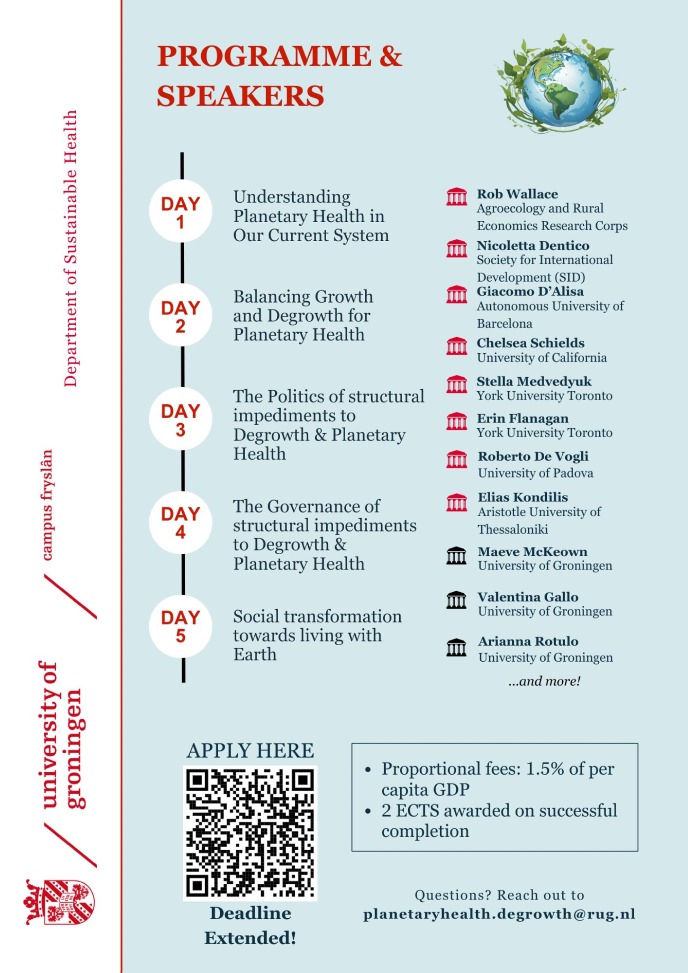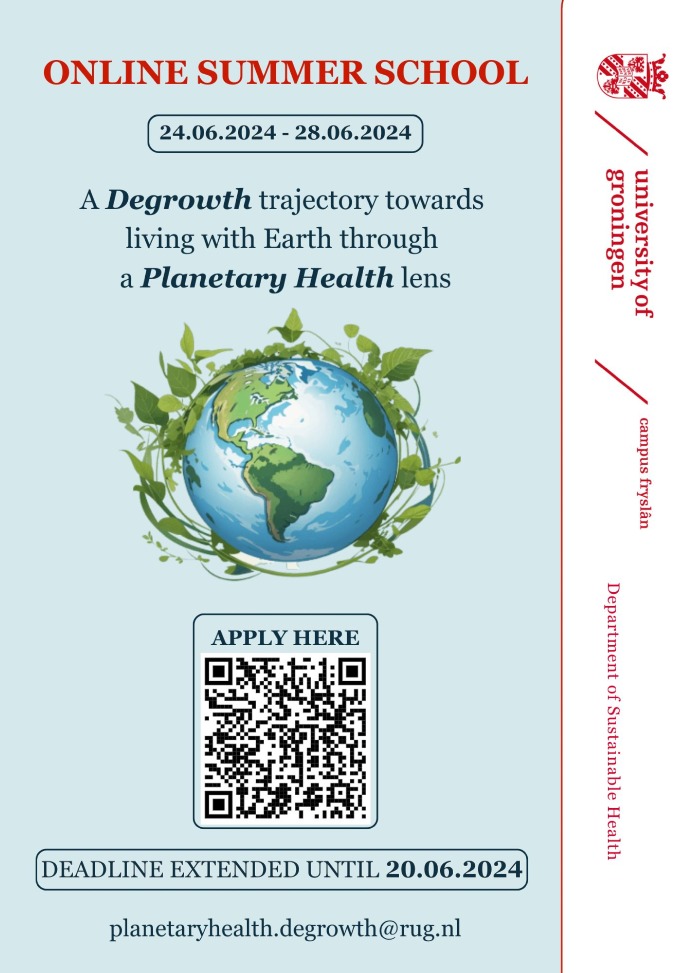A degrowth trajectory towards living with Earth through a Planetary Health lens


We live in an era of accelerated crises: ecological collapse, global pandemics, and escalating conflicts, amongst others. These crises are not isolated events but rather downstream consequences of a series of upstream drivers. These dynamics not only shape our physical and social environments but also perpetuate inequalities and injustice on both global and local scales. The urgency for transformative action is imperative and, as such, non-negotiable.
Faced with these challenges, there is an urgent call for innovative solutions that prioritize the health of both people and the planet.

Living in harmony with Earth, recognizing humanity as just one element within the ecosystem, demands a fundamental shift in our social norms. This shift involves prioritizing Planetary Health instead of continuous wealth accumulation - a trajectory usually referred to as Degrowth.
Planetary Health is a new field of study that focuses on the impacts of human disruption on Earth’s natural system on human health and all life on Earth [2]. Although complex, the matter under study in Planetary Health is intrinsically connected to the current challenges, shifting the focus from humans to the ecosystems they are embedded in. Thus, Planetary Health is a necessary lens for analysing and understanding the upstream drivers and downstream consequences pertaining to our society.
Degrowth proposes a societal model that shifts from profit maximisation and accumulation – a direct result of the exploitation of nature and people – to the fulfilment of social needs and ecological justice.
The role of degrowth as a trajectory to live with Earth under a Planetary Health perspective will be a central theme of our summer school, guiding our discussion and learning.
Practical information
|
Dates
|
24 - 29 June 2024
|
|
Location
|
Online with the possibility of meeting at Campus Fryslân Leeuwarden -- the Netherlands
|
|
Level
|
The content is suitable for undergraduates, graduates, PhDs, postdocs, and practitioners interested in the scope of this summer school. No prior knowledge is required on the topic of the summer school, only interest and motivation.
|
|
Fees
|
Our summer school adopts a proportional fee structure, which amounts to 1.5% of the per capita Gross Domestic Product (GDP) of the student's country of residence. However, this fee is subject to a maximum limit of €350. For instance: Conversely, a student from the Netherlands would pay a fee of €350. Although 1.5% of the Netherlands' GDP per capita in 2022 (€52,463) would ordinarily amount to €786, the fee is reduced to €350 to adhere to the maximum cap. |
|
Academic coordinators
|
Dr Arianna Rotulo, University of Groningen Dr Valentina Gallo, University of Groningen
|
|
Contact |
planetaryhealth.degrowth@rug.nl
a.rotulo@rug.nl
v.gallo@rug.nl
|
Requirements
Key requisites:
-
Interested in exploring the intersections of planetary health, degrowth/ecosocialism, and ecological sustainability, regardless of their background;
-
Sufficient command of the English language to actively participate in the discussions and to present their own work in English;
-
Be able to join at least online. As the Summer School will unfold entirely online, we don’t require in person attendance, although students are very welcome to join us at Campus Fryslân in Leeuwarden – the Netherlands, where we have reserved a classroom for the use of our students.
This summer school is perfect for you if you are:
-
An undergraduate, graduate, and postgraduate from any field of study looking to broaden their understanding of planetary health and degrowth, with a critical lens;
-
A professional or a practitioner, especially employed in the third sector, interested in integrating the summer school’s concepts into their work;
-
An activist and community leader seeking to deepen their knowledge and impact in ecological justice and social transformation.
We particularly encourage applications from students across various disciplines to enrich the learning environment with diverse perspectives and experiences. This transdisciplinary approach aims to enhance peer learning, allowing participants to gain insights from one another's unique viewpoints.
It is expected that the participants have a sufficient command of the English language to actively participate in the discussions and to present their own work in English.
Course schedule
The summer school aims to provide a comprehensive exploration of how a degrowth transition would/should look like, in order to achieve living with Earth.
Our focus will centre around five core questions/themes serving as the foundation for our discussions, workshops, and lectures, providing a structured framework for our collective inquiry
Every theme will be covered by expert keynote speakers and through a round-table discussion. In the afternoon, students will be asked to reflect and discussed on the topics covered.
Day 1:
Theme: Understanding Planetary Health in Our Current System
Question: What does it mean working towards living with Earth under a Planetary Health lens?:
We will unpack fundamental concepts of ecosystem ecology and public health examining what it means to work towards this goal within the limits of our current economic and political systems. This exploration will provide a baseline understanding of the challenges and opportunities that lie ahead.
Day 2:
Theme: Balancing Growth and Degrowth for Planetary Health
Question: What should we grow and what should we degrow to achieve living with Earth?
We will focus on identifying which sectors of the economy should be expanded and which should be scaled back or restructured to support living with Earth. This includes a critical assessment and mutual understanding of our priorities, as well as the impacts of various industries on the commodification of nature and human health.
Day 3
Theme: The Politics of structural impediments to degrowth & Planetary Health
Question: What are the structural political impediments at local, national, and international levels?
We will delve into the structural political obstacles that hinder the paradigm shift towards degrowth and planetary health, at local, national, and international levels. This will include discussions on policy, economic systems, and societal norms that perpetuate exploitation and wealth accumulation.
Day 4:
Theme: The Governance of structural impediments to Degrowth & Planetary Health
Question: What are the structural governance impediments at international level?
We will explore which are the international governance priorities to promote degrowth effectively. This will involve case studies and comparative analyses to understand the nuances and feasibility of applying degrowth principles in different settings.
Day 5:
Theme: Social transformation towards living with Earth
Question: What are the collective challenges ahead after learning from current experiences?
We will address the many different options of becoming agents of social change to promote degrowth within a Planetary Health framework. This includes examining existing experiences and proposing interdisciplinary approaches to transformative change.
Learning outcomes
After this summer school you will be able to:
-
Explain the fundamentals of planetary health and degrowth: Clearly articulate the underlying determinants of planetary health, the principles, and the mechanisms that integrate degrowth with planetary health.
-
Design and Evaluate Degrowth Strategies: Participants will be able to design strategies that prioritize ecological and social justice. They will learn to evaluate the potential effectiveness and feasibility of these strategies using criteria that encompass ecological, economic, and social dimensions, aligned with Planetary Health principles.
-
Analyse policies and governance structures through a planetary health perspective: Learners will gain the competence to critically analyze existing structures and propose modifications to better align with the principles of Planetary Health and degrowth.
-
Communicate Complex Concepts Effectively: Participants will be equipped with the ability to communicate complex concepts related to Planetary Health and degrowth to a variety of audiences, including non-experts, in a clear and persuasive manner.
Workload
-
Preparation: 30 hours
-
Lectures: 20 hours
-
Presentation: 8 hours
Upon successful completion of the programme, the Summer School offers a Certificate of Attendance that mentions the workload of 56 hours (28 hours corresponds to 1 ECTS). Students can apply for recognition of these credits to the relevant authorities in their home institutions, therefore the final decision on awarding credits is at the discretion of their home institutions. We will be happy to provide any necessary information that might be requested in addition to the certificate of attendance.
Application procedure
To apply, kindly fill out the online application form. Please note that you will be asked to upload the following documents:
-
Curriculum Vitae (max. 2 pages)
-
Motivation letter, clearly stating the following:
a. What are your fields of study/expertise/discipline?b. Why are you interested in this summer school?c. What do you expect from this summer school?
Selection will occur on a rolling basis, and applicants will be informed of the outcome at least one month prior to the start of the summer school. The last moment to apply is 20 June 2024.
